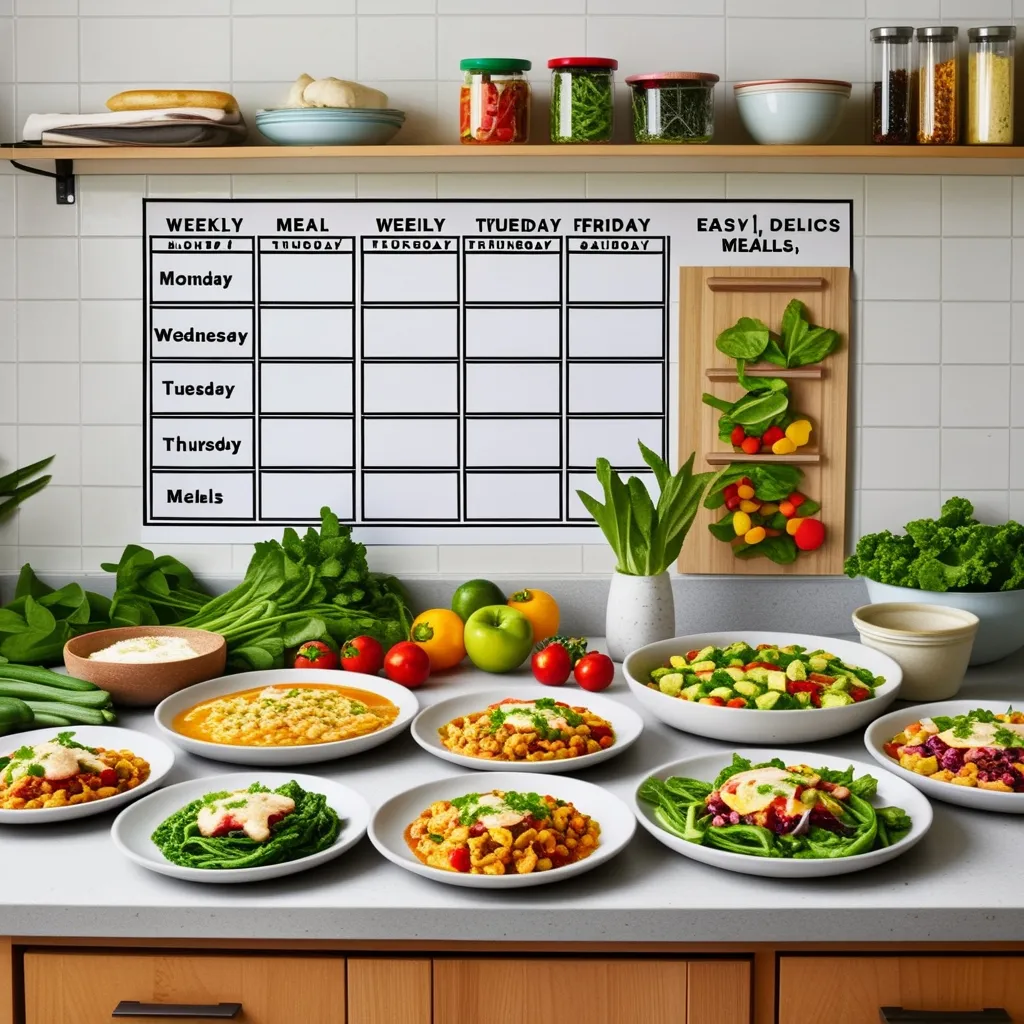Embracing Simple Meal Planning for Busy Weeks
In our fast-paced modern lives, the idea of maintaining a healthy diet often feels like climbing a mountain. Juggling work, family, social engagements, and personal time can make nutritious eating seem almost impossible. But, believe it or not, a bit of meal planning can turn this overwhelming task into a smooth, manageable part of your weekly routine. Here’s the lowdown on making meal planning easy and sustainable.
Why Bother with Meal Planning?
First off, meal planning isn’t just about deciding what you’ll eat every single day. It’s more about crafting a system that saves you time, cuts down on food waste, and ensures you’re munching on healthy, scrumptious meals. Especially for those juggling many roles—parents, professionals, caretakers—a good meal plan can be a game-changer. It’ll help you dodge those frantic last-minute takeout decisions and guarantee that you and your loved ones are eating well-rounded meals.
Kick Things Off by Checking Your Schedule
Before diving into meal planning, pull out that calendar and check what the coming week looks like. Pinpoint any days where dining out or social events might influence your meals. This helps in avoiding over-planning and builds in some flexibility. For example, if you have a dinner date on Wednesday, that’s one less meal you need to plan for.
The Fun Part: Choosing Your Meals
Picking out meals can actually be pretty enjoyable, especially when you start with your favorite dishes. If meal planning is new territory for you, stick to simple recipes you’re already comfy with—it’s easier to get creative later on. Let’s say you’re a pasta lover; whipping up some classic macaroni and cheese can be your starting point. As you gain confidence, feel free to swap in some healthier ingredients or try out new dishes.
Peek Into Your Pantry and Freezer
Before dashing to the grocery store, take a thorough look at what you’ve already got stocked. This little step helps you dodge the mistake of buying duplicates and cuts down on waste. If you find leftover ingredients from earlier meals, think about how you can use them. Leftover chicken from last night’s dinner? Turn it into a tasty chicken salad or a comforting soup.
Craft a Grocery List
You’ve got your meals picked out, now it’s time to jot down a grocery list. Carefully go through the ingredients needed for each recipe. This way, when you’re at the store, you won’t forget any essentials. It’s wise to take one last look at your pantry before shopping to avoid ending up with multiples of the same item.
Grocery Shopping Made Simple
Grocery shopping doesn’t have to be an ordeal if you go prepared. Try to limit your store trips to once a week. This not only saves time but helps you stick to your list and avoid those impulsive buys. If you’re planning for two weeks, stock up on items that have a longer shelf life and maybe freeze some meal components to use later.
Shortcuts to Simplify Meal Planning
Meal planning needn’t take up copious amounts of your time. Use these handy shortcuts:
- Recycle Meal Plans: Reuse meal plans from previous weeks and just swap out a meal or two to keep things exciting.
- Love Those Leftovers: Leftovers can be a lifesaver. Turn dinner into next day’s lunch effortlessly.
- Pre-Made Plans: There are plenty of meal plans available online to borrow from. Some food blogs feature weekly plans that can be a huge timesaver.
- Don’t Shy Away from Takeout: If it’s a jam-packed week, embracing takeout or delivery can be a smart move. Plan for it and it’ll make your week easier.
Make Meal Planning Fun
Yes, meal planning can be enjoyable, even relaxing. Set aside some dedicated time each week, maybe with a cup of coffee or a glass of wine, to plan your meals. Think of it as a self-care routine. Browse recipes leisurely and compose your grocery list. Over time, you’ll find that meal planning is there to simplify your life, not complicate it.
Mix Things Up with New Recipes
While creating a routine is great, adding variety keeps things fresh and prevents boredom. Aim to try one new recipe a week to spice things up. If you’re hesitant toward new foods, start small—maybe incorporate a new fruit or vegetable every few weeks. This way, slowly but surely, you’ll expand your culinary horizons.
What You Gain from Meal Planning
The perks of meal planning go beyond just eating well:
- Saves Time: By having a set plan, you avoid frantic, last-minute decisions about what to eat, freeing up more time.
- Reduces Waste: You use up what you buy, meaning less food ends up in the trash, and you save some money.
- Healthier Eating: Planned meals often turn out to be more balanced and nutritious compared to impromptu fast food runs.
- Easier Shopping: Knowing exactly what you need makes grocery shopping quicker and more efficient.
Getting a Meal Plan into Your Routine
Don’t think you have to go all-in immediately. Start with planning a few days at a time and then work your way up to a full week. Here’s a simple example:
Monday:
- Breakfast: Overnight oats
- Lunch: Salad with pre-grilled chicken
- Dinner: Macaroni and cheese
Tuesday:
- Breakfast: Avocado and egg toast
- Lunch: Turkey sandwich
- Dinner: Chicken Caesar salad
Wednesday:
- Breakfast: Spinach omelet
- Lunch: Crackers and hummus
- Dinner: Pizza or dining out
Thursday:
- Breakfast: Chia pudding
- Lunch: Soup
- Dinner: Pasta with vegetables
Friday:
- Breakfast: Oatmeal
- Lunch: Fruit and vegetables
- Dinner: Taco bowls
Organizing your meals this way helps you stay on track without getting bogged down.
In a Nutshell
Meal planning is much more than just picking out meals; it’s about making your life easier and healthier. With just a bit of time spent upfront, you can save time, cut down on stress, and ensure balanced eating. Start small, utilize shortcuts, and embrace variety to keep the whole process interesting. Stick with it, and soon enough, you’ll be enjoying nutritious meals minus the hassle.






